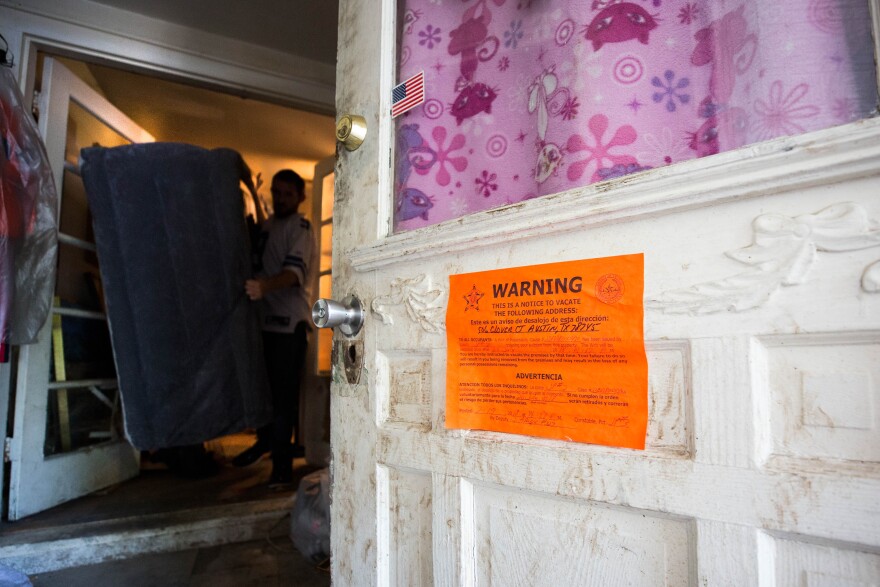Landlords who own property in Travis County filed more evictions in local courts last year than they have since at least 2014. Landlords filed 13,209 evictions in 2024, an increase of about 25% from the year before.
The data comes from a report released last week by a tenant advocacy group, BASTA, or Building and Strengthening Tenant Action. The organization pulled the data from Travis County judicial records.
Judge Sylvia Holmes, who presides over eviction cases in the southwest part of the county, said she was not surprised by the data. She said many tenants she sees are unable to pay their rent because of an emergency.
“When forced to repair their car that broke down so they could go to their job to keep making money, they had to make a decision about where that money goes,” Holmes said. “And then there’s sort of a spiral.”
An eviction filing does not mean a renter is eventually evicted. A judge still has to rule on the case. The vast majority of eviction filings are because a renter failed to pay their rent.
Emily Blair, executive vice president of the Austin Apartment Association, said more eviction filings could be a natural result of there being more renters. But it’s hard to gauge how much of the rise in eviction cases can be attributed to a higher number of renters in the county.
Data from the U.S. Census Bureau, which tracks this, is not available yet for 2024. Between 2022 and 2023, the number of renter households in Travis County rose by about 5%.
BASTA tracked the amount of money a tenant owed when a judge ruled against them in an eviction case. The majority of the cash owed is typically unpaid rent, but can also include attorney fees.
In 2024, the median judgment amount for renters who had been evicted in Travis County was $2,984. That was down from 2022, when renters in eviction court owed a median of $4,362, but still double the amount in 2019.
That tracks with rent prices. The average price of rent in Austin spiked in 2021 and 2022, as tens of thousands more people moved to the city and for-sale prices put buying a home farther out of reach for many.
As the demand for rental housing rose, so did the prices landlords charged. In the first several months of 2022, average monthly rents in the Austin area rose as much as 24% year over year. Rent increases have since stalled and prices have been falling for almost two years.
At the same time, BASTA also found that the eviction process has slowed slightly in the past couple of years. The median time from a landlord filing an eviction to a judge ruling against a tenant took 20 days, according to its analysis. That's up from 18 days before the pandemic.
It’s unclear how that compares to other jurisdictions in the state or where Texas' eviction timeline falls when compared with other states. In California, the eviction process can take 30 to 45 days, while in Pennsylvania a case must be heard within 15 days. In Texas, judges are required by law to hear eviction cases within 21 days of a landlord filing the case.
The report from BASTA comes as state lawmakers are debating a contentious eviction bill. Tenant advocates have warned that House Bill 32, authored by Republican state Rep. Angie Chen Button from Dallas, would strip renters of some of the rights they currently have in the eviction process. An identical bill has been filed in the Senate.
Defenders of the legislation say it’s needed to help landlords further protect their private property rights.
The bill carves out processes for landlords to submit a packet of evidence when they file the case. If accepted by a judge, this could allow a landlord to evict a tenant within 10 days.
Support for KUT's reporting on housing news comes from the Austin Community Foundation and Viking Fence. Sponsors do not influence KUT's editorial decisions.







